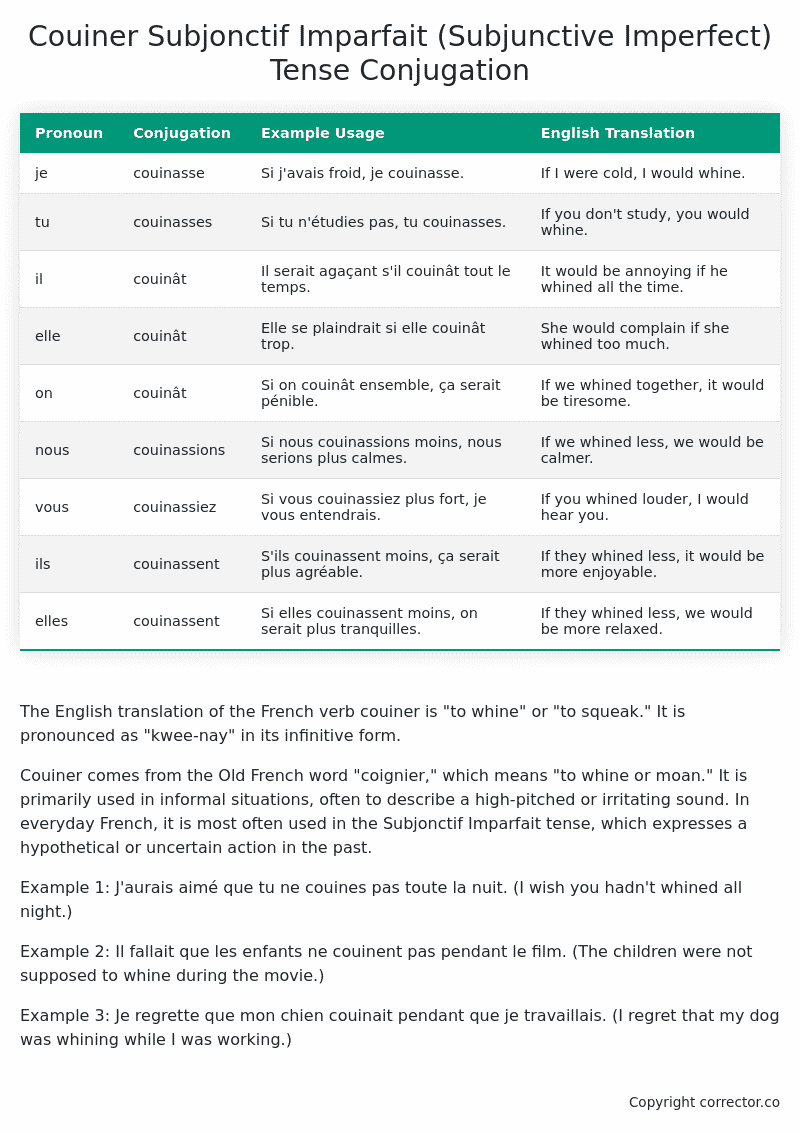Subjonctif Imparfait (Subjunctive Imperfect) Tense Conjugation of the French Verb couiner
Introduction to the verb couiner
The English translation of the French verb couiner is “to whine” or “to squeak.” It is pronounced as “kwee-nay” in its infinitive form.
Couiner comes from the Old French word “coignier,” which means “to whine or moan.” It is primarily used in informal situations, often to describe a high-pitched or irritating sound. In everyday French, it is most often used in the Subjonctif Imparfait tense, which expresses a hypothetical or uncertain action in the past.
Example 1:
J’aurais aimé que tu ne couines pas toute la nuit.
(I wish you hadn’t whined all night.)
Example 2:
Il fallait que les enfants ne couinent pas pendant le film.
(The children were not supposed to whine during the movie.)
Example 3:
Je regrette que mon chien couinait pendant que je travaillais.
(I regret that my dog was whining while I was working.)
Table of the Subjonctif Imparfait (Subjunctive Imperfect) Tense Conjugation of couiner
| Pronoun | Conjugation | Example Usage | English Translation |
|---|---|---|---|
| je | couinasse | Si j’avais froid, je couinasse. | If I were cold, I would whine. |
| tu | couinasses | Si tu n’étudies pas, tu couinasses. | If you don’t study, you would whine. |
| il | couinât | Il serait agaçant s’il couinât tout le temps. | It would be annoying if he whined all the time. |
| elle | couinât | Elle se plaindrait si elle couinât trop. | She would complain if she whined too much. |
| on | couinât | Si on couinât ensemble, ça serait pénible. | If we whined together, it would be tiresome. |
| nous | couinassions | Si nous couinassions moins, nous serions plus calmes. | If we whined less, we would be calmer. |
| vous | couinassiez | Si vous couinassiez plus fort, je vous entendrais. | If you whined louder, I would hear you. |
| ils | couinassent | S’ils couinassent moins, ça serait plus agréable. | If they whined less, it would be more enjoyable. |
| elles | couinassent | Si elles couinassent moins, on serait plus tranquilles. | If they whined less, we would be more relaxed. |
Other Conjugations for Couiner.
Le Present (Present Tense) Conjugation of the French Verb couiner
Imparfait (Imperfect) Tense Conjugation of the French Verb couiner
Passé Simple (Simple Past) Tense Conjugation of the French Verb couiner
Passé Composé (Present Perfect) Tense Conjugation of the French Verb couiner
Futur Simple (Simple Future) Tense Conjugation of the French Verb couiner
Futur Proche (Near Future) Tense Conjugation of the French Verb couiner
Plus-que-parfait (Pluperfect) Tense Conjugation of the French Verb couiner
Passé Antérieur (Past Anterior) Tense Conjugation of the French Verb couiner
Futur Antérieur (Future Anterior) Tense Conjugation of the French Verb couiner
Subjonctif Présent (Subjunctive Present) Tense Conjugation of the French Verb couiner
Subjonctif Passé (Subjunctive Past) Tense Conjugation of the French Verb couiner
Subjonctif Imparfait (Subjunctive Imperfect) Tense Conjugation of the French Verb couiner (this article)
Subjonctif Plus-que-parfait (Subjunctive Pluperfect) Tense Conjugation of the French Verb couiner
Conditionnel Présent (Conditional Present) Tense Conjugation of the French Verb couiner
Conditionnel Passé (Conditional Past) Tense Conjugation of the French Verb couiner
L’impératif Présent (Imperative Present) Tense Conjugation of the French Verb couiner
L’infinitif Présent (Infinitive Present) Tense Conjugation of the French Verb couiner
Struggling with French verbs or the language in general? Why not use our free French Grammar Checker – no registration required!
Get a FREE Download Study Sheet of this Conjugation 🔥
Simply right click the image below, click “save image” and get your free reference for the couiner Subjonctif Imparfait tense conjugation!

Couiner – About the French Subjonctif Imparfait (Subjunctive Imperfect) Tense
Formation
Common Everyday Usage Patterns
Interactions with Other Tenses
Subjonctif Présent
Indicatif Passé Composé
Conditional
Conditional Perfect
Summary
I hope you enjoyed this article on the verb couiner. Still in a learning mood? Check out another TOTALLY random French verb conjugation!


